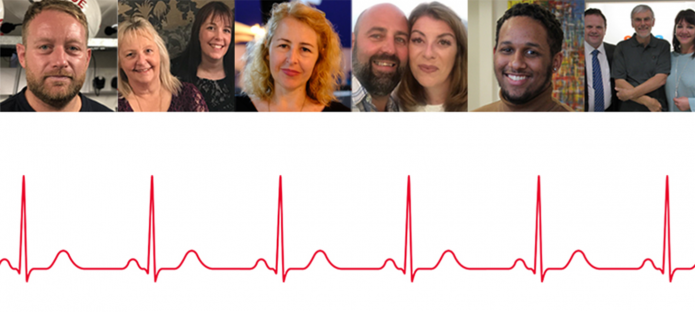
It should have been a normal PE lesson during a normal school day for Sam Mangoro. He was doing a basketball warm-up and remembers lining up for the next drill when he suddenly collapsed. Sam had suffered a cardiac arrest and the next thing he remembers is waking up in Southampton General Hospital.
Sam was lucky to wake up, as out of hospital cardiac arrest survival rates in the UK still remain stubbornly low. In his case, a series of fortunate events gave him his best chance of survival. When Sam went into cardiac arrest, a teacher attending a job interview recognised the danger he was in. She told the other teachers to get a defibrillator and began CPR. Sam was shocked four times by the defibrillator, which had only been bought and installed by the school just a few weeks prior to Sam’s cardiac arrest.
He was also lucky to have expert help a phone call away. When the emergency services began to arrive, Resuscitation Council UK’s Honorary Treasurer, Professor Charles Deakin, was one of the first on the scene. He was working with the ambulance service on a voluntary basis and occasionally responded to emergencies where they needed some extra back up. He was in Southampton when his pager went off, asking if he was available for a cardiac arrest.
Sam was still unconscious when Professor Deakin arrived, so his first order of duty was to work with the paramedics to stabilise his condition. When it was established that Sam wouldn’t deteriorate further, he was taken to Southampton General hospital where he remained for three weeks.
It was a terrifying incident for Sam and his family - especially as this wasn’t Sam’s only cardiac arrest experience. When he was ten days old, he was rushed to hospital when his heart stopped, and he went into multiple organ failure. He was revived by hospital staff, but his parents were gently advised to say goodbye to their son, as the chances of him surviving a transfer to a hospital in London were exceptionally slim.
Sam was a fighter - and he defied the odds to be discharged from hospital a few weeks later and told he had made an incredible recovery. He was placed on medication, and it was feared he would need a heart transplant, but by the age of 11 he was off his medication and living a pretty normal life - until his second cardiac arrest occurred.
This time, it was determined that his cardiac arrest seemed to have been caused by abnormal heart rhythms relating to the scarring on his heart from the arrest he suffered as a baby. It was likely that he unknowingly had these abnormal rhythms for quite a while. He was fitted with an Implantable cardioverter defibrillator (ICD) - a small device to treat abnormal heart rhythms, which shocks his heart back into rhythm to prevent future cardiac arrest. Since then, Sam has been healthy and happy - and inspired to educate and help other people.

He started the ‘All Heart' campaign to make defibrillators compulsory in schools and raise money for more AEDs and CPR training. He is committed to sharing his story to raise awareness for the importance of the lifesaving skills and equipment.
Sam has made thousands of people aware of the dangers of unknown heart issues and the importance of life-saving skills and devices. The ‘All Heart’ campaign has raised thousands of pounds and placed two defibrillators in schools - but there’s far more work to be done, according to Sam.
“For me, it doesn’t stop there. I’ve met far too many people over the years who have very opposite stories to mine, stories that did not end so well, and they are campaigning because they’ve lost loved ones due to cardiac arrest. Because of that, I will keep campaigning until these statistics change and more lives are saved.”
Watch Sam talk about his experience:
Sam Mangoro's CPR Story from RCUK on Vimeo.
To watch Sam talk at the 2015 RCUK Scientific Symposium, click here.
Want to learn lifesaving CPR skills? Here’s how:
- Lifesaver: Play the award-winning CPR training game that will show you what it’s like to save a life. Free on browser, iOS and Android.
- Restart a Heart: In and around October 16 every year, communities come together to learn CPR. Will you join us this year?
Facts about CPR
- When someone has a cardiac arrest, every minute without CPR and defibrillation reduces their chances of survival by 7-10% (1)
- The chance of survival from out-of-hospital cardiac arrest can be increased two-to-threefold by the immediate provision of bystander CPR. (2)
- There are around 80,000 out-of-hospital cardiac arrests in the UK per year. (3)
- AEDs are known to drastically boost survival rates of out-of-hospital cardiac arrests. Defibrillation within 3–5 min can produce survival rates as high as 50%–70%. (4)
- Anyone can perform CPR, and use an AED, even if you haven’t had training. Ambulance dispatchers are able to give telephone instructions to help undertake chest compressions at the scene.

